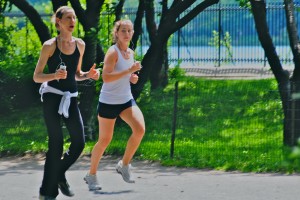Are you buying the change … or being the change?
 “Buying the change” and “being the change” may make sense individually, but I put them together in this article to make a distinction between these two behaviors — one of which may seem to hurt but is good for your long-term success as an endurance runner or walker, and one of which feels good but may hurt your long-term success.
“Buying the change” and “being the change” may make sense individually, but I put them together in this article to make a distinction between these two behaviors — one of which may seem to hurt but is good for your long-term success as an endurance runner or walker, and one of which feels good but may hurt your long-term success.
Basically, “buying the change” means that you buy something, some experience, or someone’s time with the hope (sometimes justified) that it will lead to change — presumably for the better.
In contrast, “being the change” means that you behave how you want to see yourself in order to effect your desired change.
So, who are you?
This May Be You
As an endurance athlete, you may know the power of being the change. You make little changes in your behavior over a long period of time, and, the next thing you know, you are completing a race at a distance that four to six months earlier would have been impossible!
Unfortunately, This May Be You, Too
We’ve all seen examples in others’ lives of buying the change, too.
- A family member buys exercise equipment, expecting that it will magically transform his or her fitness, and it becomes a clothes rack.
- A friend hires a personal trainer, but the sum of the fitness transformation does not match the sum of the weekly payments.
- Or, a colleague pays the registration fee for a half marathon, expecting that the fee is the biggest hurdle to completing the race.
Our own erroneous attempts to buy the change are harder to see.
This Was Me
I’ll start, by appling the above three examples to my own life:
- I once bought a large piece of strength-training equipment, swearing to my wife that I was going to use it every day. I even had her take some “before” photos of me. But, after a year, I came to detest the equipment sitting in my home office — as if it were daring me to work out.
- My wife and I engaged a personal trainer to spend an hour with us in our home every Saturday morning for more than a year. Our initial goals were to develop stronger cores and get some cross-training to complement our endurance running and walking. The trainer always had a new set of tailored-to-us routines for us each Saturday, and we made a lot of improvement in the first few months. But, eventually, and due to both reasonable and lame excuses, we often did not stick to our schedule during the week following each Saturday session.
- I cannot say that I’ve done this when it comes to races, but I once had a bad habit of buying books with high hopes but no follow-up action of actually reading them — as if I were going to use osmosis to learn what they were going to teach me!
I challenge you to make a list of times in which you tried to buy the change instead of being the change.
Warning: This exercise may make you uncomfortable, but you can keep your list to yourself. Plus, your brutal self-honesty can help you in the long run, if you know what to do with it, which leads me to say…
There Is Hope
Here is where I want to offer you hope — in the form of a reading assignment!
You see, about a week ago I got the idea to write an article about the cumulative effect of preparing for a marathon and cumulative effect of the many small decisions and actions you can take throughout a marathon.
Next, a business peer recommended a book about, as she described it, the power of saying “No” to opportunities that do not move one toward one’s goals.
Finally, last Saturday on a 12-mile training run, one my training partners told me that the way that she had improved her speed in road races not only was by running trails but — point blank — also by religiously doing this five days a week. Paraphrasing her, she said to me, “Kirk, the way that I get better is by working at it!”
Well, I looked up and bought the peer-recommended book over the weekend, and I soon realized that it nicely tied together my article idea with what my training partner told me last Saturday. In fact, I read half of the book yesterday in just over an hour, and I want to recommend it to you even before I finish reading it because I sincerely believe that it will help you to be the change instead of trying to buy the change.
The book is The Compound Effect.
Take Action
Get and read the book. Complete the action steps at the end of each chapter. Then, return here to share with your fellow readers and me how it has changed your life. I look forward to your comments!
P.S. I have nothing against exercise equipment, personal trainers, or registration fees for races. I believe that all three can motivate you. But, the change begins with you. For example, you may buy a pedometer to help you to track your daily steps, and you may get my FREE “10K Steps/Day Programs” report, but you still have be the change. Go for it!